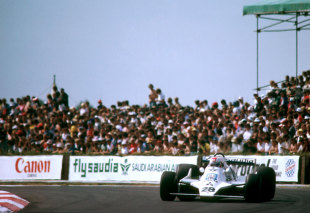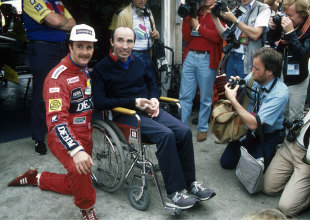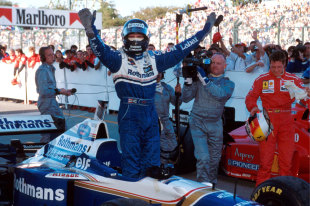- Top ten ... Williams wins
Williams' finest hours
ESPNF1 Staff
May 18, 2012
After Pastor Maldonado's success at the Spanish Grand Prix , we look back at ten of Williams' best and most significant victories

Clay Regazzoni on his way to Williams first grand prix victory © Sutton Images
Enlarge
Related Links
- Drivers:
- Alan Jones
- |
- Nigel Mansell
- |
- Juan Pablo Montoya
- |
- Clay Regazzoni
- |
- Keke Rosberg
- |
- Sir Frank Williams
- Teams:
- Williams
1979 British Grand Prix
The Williams FW07 made its debut at the fifth round of the 1979 championship, but while it was clearly a very fast car there were still some teething issues at its first few races. The previous year Lotus had introduced the game-changing 79 that made use of ground-effect aerodynamics to generate unprecedented levels of downforce. The FW07 was built along similar lines but the full potential of the car's underbody was not realised until Frank Dernie made a couple of tweaks to "tidy up the floor around the engine" ahead of the British Grand Prix. At the time Williams was using a wind tunnel at Imperial College London and in the week before the race Dernie made a breakthrough. "It was the single biggest improvement I think I've ever seen in the wind tunnel," Dernie told Maurice Hamilton for the book Williams. "It was so big that I came back early from the wind tunnel and drew it." When the cars rocked up for first practice at Silverstone it was immediately obvious that they were the class of the field. Alan Jones duly took pole position by over half a second and had a 25-second lead in the race before an oil pressure problem forced him to retire. The second Williams of Clay Regazzoni took the lead and won by 24.3 seconds from the turbocharged Renault of Rene Arnoux. It was Williams' first grand prix victory and firmly underlined the team's position among F1's elite.
1980 Canadian Grand Prix
Following its breakthrough year in 1979, Williams wasted no time in fulfulling its full potential. Jones won the opening race of the 1980 season in Argentina and then followed it up with two more wins mid-season in France and Great Britain. His main competition was from Brabham's Nelson Piquet and heading to the final two rounds Piquet held a one point lead in the championship. The penultimate round was held in Canada and tension was running high as the two championship protaganists lined up side-by-side on the front row of the grid. Piquet was on pole but Jones got a better start and heading into the first corner they collided, with the Brabham hitting the wall and causing a chain reaction of collisions that took out eight cars and forced a restart. Piquet jumped into his spare car and took the lead when the race got back underway, but unlike his damaged race car the spare was fitted with a highly-strung qualifying engine that blew after 24 laps. Jones then had a clear road to victory and with it chalked up Williams' first drivers' title.
1982 Swiss Grand Prix
In a bizarre and tragic year for Formula One, Keke Rosberg won the championship for Williams with just one victory to his name. The death of Gilles Villeneuve robbed the sport of one of its greatest talents and most peoples' championship favourite and towards the end of the year the career of his Ferrari team-mate Didier Pironi came to an end when he broke his legs in an accident at Hockenheim. The absence of Pironi from the final four rounds left the title wide open with Rosberg among those poised to take advantage. At the 14th round - the Swiss Grand Prix held at Dijon-Prenois in France - he finally won his first championship race and leapfrogged to the top of the drivers' standings, three points clear of Pironi and 11 points clear of Alain Prost. It was a closely fought affair with Rosberg passing Prost for the lead on the penultimate lap as the Frenchman's tyres struggled for grip on the high-speed circuit. The win didn't secure Rosberg the title but it put him in prime position.
1984 Dallas Grand Prix
In what was a mostly barren season for Williams, Rosberg took a fantastic victory at the bizarre but thrilling Dallas Grand Prix. In searing heat, the one-off track disintegrated under the strain of 26 Formula One cars and got its revenge by spitting several of them into the barriers over the course of the race. From eighth on the grid, Rosberg picked his way through the field and took the lead when Nigel Mansell's front tyres ran out of grip and he ran wide. Alain Prost, who had been trading places with Rosberg earlier in the race, took the lead on lap 49 but eight laps later put his McLaren in the wall. Rosberg eventually won by 22 seconds from Rene Arnoux's Ferrari and on his final lap picked his way around a circuit littered with broken F1 cars, left stranded between the concrete walls of the track by their drivers.

Nigel Mansell poses for a photo with Frank Williams on his return to the paddock © Sutton Images
Enlarge
1986 British Grand Prix
On his way back home from a routine test at Paul Ricard, Frank Williams suffered a life-changing crash after losing control of his Ford Sierra hire car on the way to the airport. The accident hospitalised him for 12 weeks and paralysed him from the chest down, but thanks to his sheer will power he survived and returned to the paddock at that year's British Grand Prix. Although he watched the race itself from the comfort of his home, he was treated to a dominant one-two victory as Nigel Mansell held off team-mate Nelson Piquet for a home victory. In lieu of Frank his wife Ginny made the trip to circuit to hold the trophy aloft after the race.
1987 British Grand Prix
A year later and it was another one-two victory for Williams on home soil with Mansell again getting the better of Piquet. The pair were separated by just 1.9s as they crossed the line but were a full lap ahead of the opposition as the Williams FW11B bossed the field at the high-speed Silverstone. The crucial moment of the race came on lap 63 of 65 as Mansell sold his team-mate a dummy to pass into Stowe Corner to the delight of the crowd. "I think it was a great race for everybody watching," Mansell said afterwards. "I think for the last twenty laps I was driving ten tenths. I don't like doing that on fast circuits, but obviously it was required to beat such a fantastic driver in front. The crowd was unbelievable and I have got to say really they won the race for me. For the last 15 laps they were waving on every corner."
1992 British Grand Prix
The 1992 season was a remarkable one for Williams with 11 victories from 16 races and Nigel Mansell sealing the championship at the 11th round. Arguably the team's zenith that year came at its home race as Mansell dominated the field at Silverstone to win in front of his adoring fans. It was around that time that rumours started to surface that engine-supplier Renault was keen to tempt Alain Prost out of his sabbatical and into the Williams cockpit. The resulting deal with Prost for 1993, combined rumours that Ayrton Senna was next in line to join the team, ultimately tarnished the relationship between Mansell and Williams and led to the British driver announcing his retirement at the Italian Grand Prix... But at Silverstone in July the team was still relatively harmonious and there was little that could detract from Mansell's victory, which also broke the record for wins for a British driver. "I am going to dedicate the most historic win in my career to the fans out there, they are just unbelievable," he said. "The 28 wins hasn't sunk in yet, but for me it is just credit to the team and Renault who have given me the machinery to be able to achieve this."
1994 Spanish Grand Prix
The 1994 season was one of the most difficult in the team's history. Senna had joined at the start of the year but suffered a fatal accident at the third round at Imola, devastating the team and Formula One as a whole. Damon Hill took on the huge responsibility of team leader and responded admirably with victory in Spain just two races after Senna's death. "This was the best medicine, it was what everyone at Williams needed," he said. "I want to dedicate it to my race engineer, my mechanics, everyone at Williams and Renault, and to the people who I met in Brazil who wanted to see Ayrton win in a Williams-Renault - who never did and sadly never will. They said that they would be watching me now, so I give this victory to Ayrton's fans."

Damon Hill celebrates title success in Japan © Sutton Images
Enlarge
1996 Japanese Grand Prix
1996 was another dominant year for Williams, but despite Damon Hill winning the title it was also his final year with the team. Jacques Villeneuve arrived at the start of the season and was immediately a close match for Hill, qualifying on pole and leading most of the opening race in Australia before an oil leak saw him slip to second. The championship went down to the final race in Japan with the two Williams drivers in contention and it was decided when a wheel came off Villeneuve's car. Meanwhile Hill rounded off a hugely emotional period of his career with a fantastic victory. The BBC's Murray Walker summed up the moment brilliantly when, mid-commentary, he said: "And now I've got to stop, because I've got a lump in my throat."

